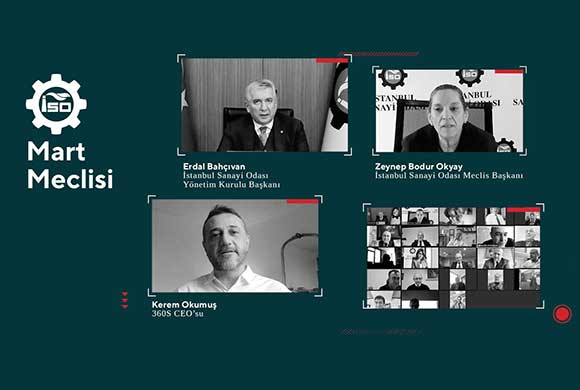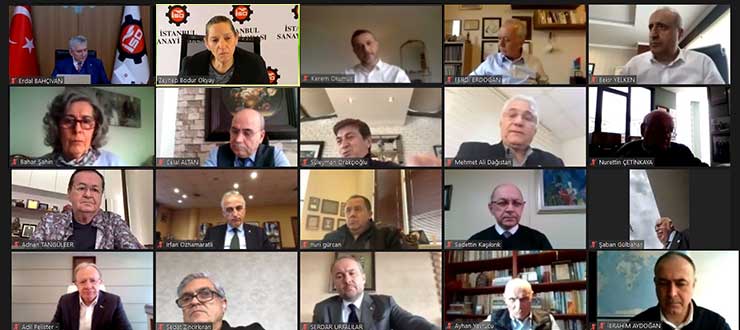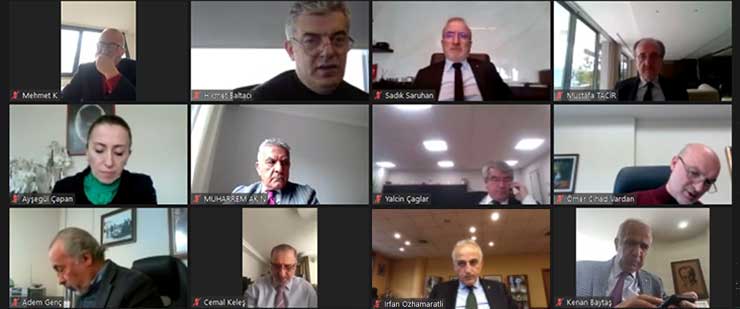News
ICI Assembly, March focused on “European Green Deal, Its Reflections on Our Industry and ICI’s Sustainability Vision”
- 24.03.2021
- News

Istanbul Chamber of Industry's (ICI) March Assembly was held on March 24, 2021 via video conferencing with the main agenda item of “European Green Deal, Its Reflections on Our Industry and ICI’s Sustainability Vision” The ICI Assembly was chaired by Zeynep Bodur Okyay, the President of the ICI Assembly and the guest speaker on the agenda item was Kerem Okumuş, Sustainability Advisor to ICI and CEO of S360.

İstanbul Chamber of Industry
Chairman of the Board
Erdal Bahçıvan
“European Green Deal is a risk for Türkiye, but a brand-new opportunity for sustainable development” said ICI’s Chairman Erdal Bahçıvan in his speech at the Assembly. “The collaboration of all segments for the adaptation of Turkish industry to green transition will enable our country to reach its rightful place in the new trading race. The amounts to be paid to the EU under the Carbon Border Adjustment may be used to transform the Turkish sectors by establishing a carbon pricing system."
Bahçıvan explained the works they plan to do on the subject: “With our five-theme ICI Sustainability Vision, we will support our industrial companies build higher added value in the global value chain and increase their competitive sustainability competencies. Our ICI Sustainability Platform created with the participation of industrialists, academics, public and NGO representatives will assume a think-tank mission."

President of the ICI Assembly
Zeynep Bodur Okyay
The March Assembly was called to order by Zeynep Bodur Okyay, the President of the ICI Assembly. Okyay made the following statement regarding the agenda of the meeting.
"We all accept that sustainability today has three main pillars: 'Economic, Environmental and Social'. With the inclusion of social dimension, the "Sustainability and Human" relationship has started to be addressed deeper. But as the human factor is further involved in the subject, the concept of 'good governance' started to stand out. The World Bank accepts the concept of good governance as a synonym of "healthy and sustainable development management." Good governance as the key to development and quality life has some basic principles: recognizing the rule of law, being transparent and accountable, compliance with international agreements and standards, consistency... It is also indispensable in terms of establishing democracy and ensuring its implementation with all its institutions, recognizing human rights and the rule of law, maintaining economic stability and the continued predictability, sustainability in economic management.
“Now in these difficult days when the world is reshaping after Covid, as you know, the European Green Deal announced in December 2019 is not only an economic but also an overall crucial transformation movement, as well as our top priority agenda as industrialists. The European Green Deal is seen as a process as deep as the industrial revolution, and that will bring about a profound transformation in structured business operation. This introduces a comprehensive transition that will change all manufacturing methods, waste management, energy use, product standards and consumption patterns. We see that the climate goals of the US, which officially returned to Paris Agreement as of February 19, resemble those of the EU. This also sets a new industrial policy, a new trade policy and a new foreign policy frame for both the EU and the US. It is inconceivable that Türkiye lacks a road map on this very important issue that will affect its economic future with her biggest partners in trade, the EU and the United States. And this is both an economic obligation and an ethical responsibility! We emphasize this on every platform we have been on for the past year."
After her speech, ICI Assembly President Okyay gave the floor to Erdal Bahçıvan, ICI’s Chairman, to talk about the agenda. Bahçıcan said: “With the European Green Deal announced on December 11, 2019, the EU has revealed the target of being the first climate-neutral continent by 2050. The Green Deal calls for comprehensive changes in EU policies in a set of areas from industry to finance, energy to transport, and is described as the EU's biggest initiative since the establishment of Single Market. In this context, technological development is becoming a key component in achieving the targets in many areas from consumer awareness to tracking product origin. In the new EU industrial strategy, even the prediction of 'green and digital transition' as a twin transition reveals the close relationship of sustainability and technology. As a key component of this development, the EU also aims to restore its R&D leadership, which has been transferred to the United States and China by introducing new products and production technologies as part of Green Transition.”

Bahçıvan added: “The cooperation of all segments of the society for the adaptation of the Turkish Industry to the green transition process accelerating in the world, especially in the EU, will help our country takes its place in the new competitive trade race. Among the steps the public needs to take to facilitate this process include the revision of industrial strategies in accordance with the green layout, preparing the sectoral road maps as soon as possible, determining the norms to be followed and implementing the actions. The European Green Deal is a risk for Türkiye, but it can also serve as a brand-new opportunity for a transition that aims sustainable development. It is possible to use the amounts required to be paid to the EU under the Border Carbon Regulation and the taxes already collected under different names for environmental protection, to transform Türkiye's sectors by establishing a carbon pricing system. The incentive mechanisms to encourage investment in the technologies for the transition to a low carbon economy will also be of great benefit. Furthermore, the realization of public purchases through green technology, manufacturing and services would encourage this transformation.”
Bahçıvan reminded ICI's new vision which is ‘to support our industrial companies to produce high added value in the global value chain and to increase their competitive sustainability competencies’. "Our first thematic field is Climate Change and Sustainable Industry. We're going to focus on the industrial effects of climate change and on the harmonization works to mitigate these effects” said Bahçıvan. “Now that we're beginning to heal the wounds of the pandemic, our second thematic area is the Cyclical Economy, because this is the best time for transition from linear to circular economy. The third theme is The Future of Business as it is important to catch a rapid transition wave in business in order to sustain growth. Our fourth theme will be Safe Working Environment, designing and focusing on a safe working environment. We set our fifth and final thematic area as Sustainable Finance, as the sustainability economy could also bring with it a growing need for funding. Our “ICI Sustainability Platform”, which will be formed with the participation of industrialists, academics, public and NGO representatives in line with the works we aim, including our ICI Sustainability and Coordination Branch, will assume a think-tank mission to make a strategic orientation for our activities.”

Sustainability Consultant to
ICI CEO of S360
Kerem Okumuş
Later, Kerem Okumuş, Sustainability Consultant to ICI and CEO of S360, spoke to the Assembly members. "We will go through major transitions over the next 10 years" said Okumuş and continued: "Companies are exploring key trends and global mega trends they need to consider in terms of their healthy growth. We are working on the context in which new products, services are growing. In the last 15 years, social and environmental problems have become more profoundly effective than ever. The global capital markets have experienced enlightenment in their ability to see the disorientation of economies on sustainability. A quarter of the world's financial resources flow into companies with high sustainability performance”.
Noting that climate change is one of the biggest risks for global economies, Okumuş said that the transition of Turkish industry in this sense is very important and essentially standing in the way.
“Globally, access to financing is transforming into a form of sustainability financing. Companies would therefore need to reconsider their sustainability obligations. We are obliged to realize 30-year programs in all sectors without delay and to pursue these with 5-year goals.
"We will survive the pandemic in about a year or two, and then will be facing climate change as a greater vulnerability. Not only the physical impact, but also the impact of regulation and competition is one of the focus areas. The global risk report in January 2021 by the World Economic Forum noted that the primary risk is climate and the economic damage it could bring. The United States aims a 100% transition to clean energy by 2050 while Britain has a zero-emission market target by 2050."

Emphasizing the rise in sustainability indexes on capital markets, Okumuş said that variable-cost loans, which depend on the sustainability performance to meet the growing demand for financing transition, tend to grow very rapidly. "Rhetoric is changing in the world's mainstream media and a sense of balanced growth, not a limitless growth, will be sought in the coming period. The public opinion has increased the pressure on companies and the story behind the brand is now being questioned” said Okumuş.
"The regulatory environment is changing rapidly and a follow-up mechanism should be established. There is an obligation for companies with more than 500 employees to report sustainability performance in their annual report according to a regulation adopted by the EU. The German government also plans to hold companies accountable for human rights and environmental issues in global supply chains.
“Europe is building a new development policy with the European Green Deal and renewing all its policies. Those who receive investment loans in Europe have to make sure that their project is associated with the green deal. Türkiye has to carry out its net zero-carbon transition program, covering all sectors without delay and with 30 years of planning. Digitalization is one of the most important tools of the European Green Deal. The digitalization of all sectors and the economy will also allow for increased productivity, as well as the development of new digital-oriented business models. In terms of system continuity, the Paris Agreement is the most valid agreement and Türkiye should be a party to this."
After Okumuş, the ICI Assembly members took the floor outlining their positions on the topic. The questions of the ICI Assembly members were answered by Kerem Okumuş, Sustainability Consultant to ICI and CEO of S360.